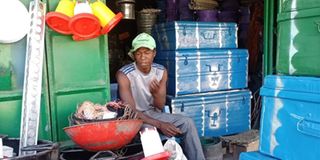How the Grade 9 transition has affected business for Jua Kali metal box makers

David Ayoo, a jua kali artisan, sits in his workshop, lost in thought.
At 3pm he has yet to make a single sale for the day.
And as the day slowly draws to a close, the middle-aged man silently wonders how his bumper season has been severely hampered by a government directive to change the school curriculum.
For the first time in decades, the curriculum change meant the end of the Form One transition. This transition had always meant the peak season for his business.
At a time like this, at the start of an academic year, business would be booming for him.
His workshop would be packed with students and parents waiting to collect their metallic school boxes as they headed off to school for Form One enrolment.
It would be a hive of activity inside the workshop as the artisan's worked round the clock to ensure they delivered the orders on time.
At a similar time last year, Oyoo, who is also the chairman of Burma Jua kali, would make 100 sales a day, with a single box going for between Sh2,000 and Sh3,000.
To meet the high demand, he would have at least five assistants working on the orders.
The difference from this year is evident in the slow pace of activity around the Burma Jua Kali market.

Traders are relying on the sale of other goods such as charcoal stoves.
At 7pm, Mr Oyoo was thinking of closing up shop for the day. He was lucky to have made two sales, which he says is enough for the day.
In a normal back-to-school season, work in his workshop would go on throughout the night.
"I would be bringing in a new team of casual workers to continue working on the orders for tomorrow's pick-up. But as you can see today, the number of customers is dwindling and in a few hours nobody will come here," he says.
Business is so bad that Mr Oyoo equates the performance with that of the Covid-19 blockade.
"I can tell you it is so bad because we usually start getting orders in August, but because parents knew there would be no Form One transition, they never ordered," he says.
"We usually use what we get from sales to pay our debts, meet family obligations and provide capital for August orders. I am afraid that this time we will have to rely on the loans to service the orders," Mr Oyoo says.


